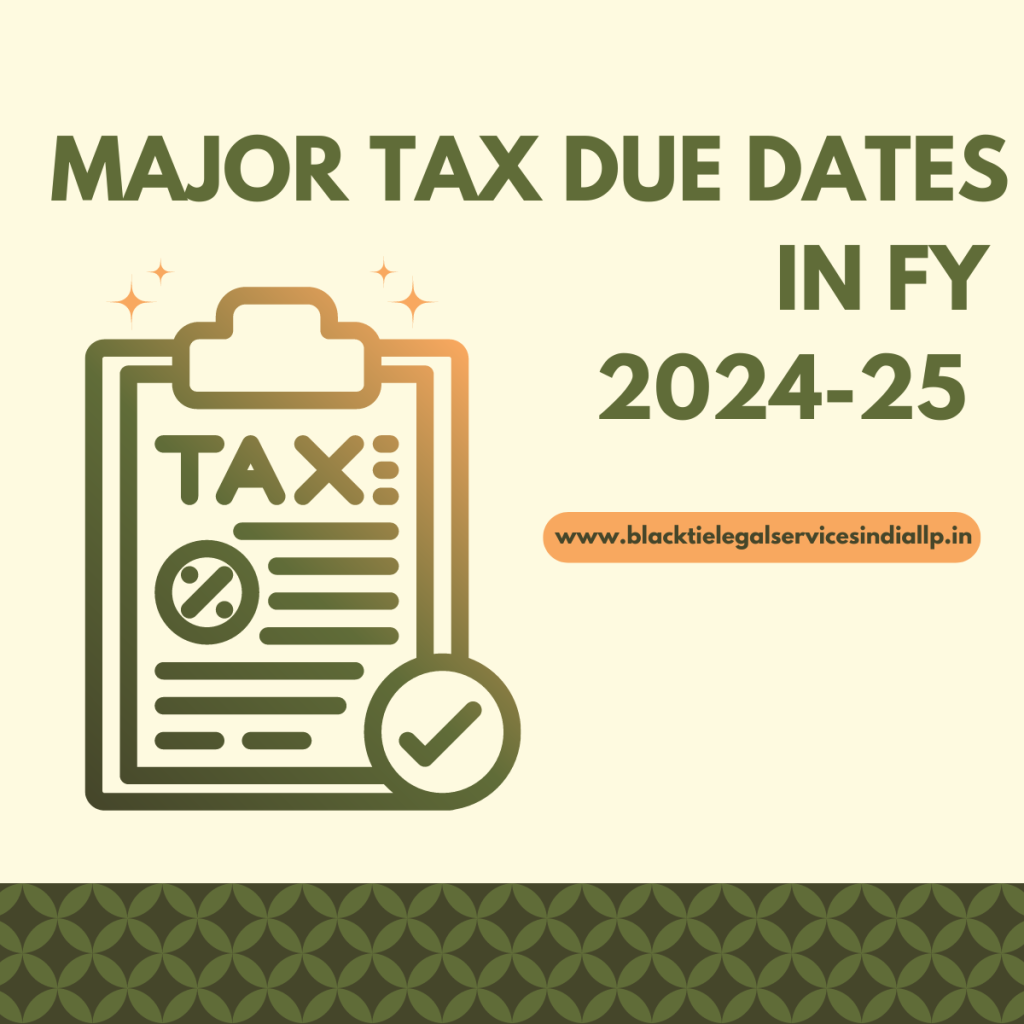[NOTE: The government has come out clear to announce that it has not extend the due date of the income tax return filing ITR. The due date for filing ITR is July 31, 2024]
Understanding the various tax due dates is helpful for every business and individual as it will help them comply and save a lot of penalties.
Various important taxes in terms of Income Tax return (ITR), Goods and Services Tax (GST), Tax Deducted at Source (TDS), Tax Collection at Source (TCS), and other statutory compliances fall in the Financial Year (FY) 2024-25.
This detailed guide covers all the important tax due dates and will be useful in creating a checklist for all compliance.
What are Tax Due Dates?

Tax due dates are legally mandated dates provided by the government’s legal administration where the citizen has to submit their tax returns and make payment for required taxes.
These dates depend on aspects such as the type of tax for instance income, sales, property, status of the taxpayer for instance individual, business among others, and region.
Failing to meet these tax due dates may lead to penalties, interest, and probably legal consequences. If one is not informed then there is likely to be a lot of complications hence the need to always plan for them.
Why are Tax Due Dates Important?

Due Dates for paying taxes are a good way to build a good relationship with the government treasury. By meeting such deadlines, citizens as well as companies contribute to the economy and do not have to pay penalties or interest rates.
Similarly, timely tax payment is also useful for governments in terms of revenue estimates and determining the amount to be spent on the public.
Major Tax Due dates in FY 2024-2025

Here overall, only a total of 5 categories of tax deadlines are mentioned, which are very important to file in FY 2024 – 2025. Which we have written below and also explained concisely:
- Income Tax Return (ITR)
- Goods and Services Tax (GST) Returns
- TDS Compliance
- TCS Compliance
- Statutory Compliance
- Annual Compliance
In the above-mentioned categories, some aspects are very important to file in August, which we have explained in detail below.
Income Tax Compliance

Income Tax compliance or ITR is a form filed with the Income Tax Department of India that records the income received, the allowable deductions, and the overall tax amount paid. Tax filing is an effective means for record keeping and in order to avoid penalties and for claiming refunds, filing must be done on time.
All the tax due dates of income tax return (ITR) filing in FY – 2024 are written below in an excellent table:
| Form/Return | Due Date | Frequency | Description |
|---|---|---|---|
| Advance Tax Payment (1st Installment) | 15th June | Quarterly | Applicable to all taxpayers |
| Advance Tax Payment (2nd Installment) | 15th September | Quarterly | Applicable to all taxpayers |
| Advance Tax Payment (3rd Installment) | 15th December | Quarterly | Applicable to all taxpayers |
| Advance Tax Payment (4th Installment) | 15th March | Quarterly | Applicable to all taxpayers |
| Income Tax Return (Non-Audit Cases) | 31st July | Annually | Individual and HUF taxpayers |
| Income Tax Return (Audit Cases) | 31st October | Annually | Individual and HUF taxpayers |
| Belated/Revised Return | 31st December following the end of the financial year | Annually | Individual and HUF taxpayers |
| Income Tax Return (Corporate Non-Audit Cases) | 31st July | Annually | Corporate taxpayers |
| Income Tax Return (Corporate Audit Cases) | 31st October | Annually | Corporate taxpayers |
| Tax Audit Report | 30th September | Annually | Corporate taxpayers |
GST Compliance

GST compliance can be understood as the activities that are carried out to ensure full compliance with the requirements of the GST law passed in India.
These include timely registration, charging the right amount in the right manner, and filing goods and services tax returns and documentation. Such compliance is mandatory for business entities to avoid penalties and have the right tax attitude towards functioning within the framework of GST.
All the tax due dates of GST return filing in FY – 2024 are written below in an excellent table:
| Form/Return | Due Date | Frequency | Description |
|---|---|---|---|
| GSTR-1 (Monthly) | 11th of the following month | Monthly | Outward supplies of goods and services |
| GSTR-3B | 20th of the following month | Monthly | Summary return |
| GSTR-5 | 20th of the following month or within 7 days after the last day of the validity period of the registration, whichever is earlier | Monthly | Non-resident taxable persons |
| GSTR-6 | 13th of the following month | Monthly | Input Service Distributors (ISD) |
| GSTR-7 | 10th of the following month | Monthly | Persons required to deduct TDS under GST |
| GSTR-8 | 10th of the following month | Monthly | E-commerce operators required to collect TCS |
| GSTR-1 (Quarterly) | 13th of the month following the quarter | Quarterly | Outward supplies for taxpayers with an aggregate turnover of up to ₹1.5 crore |
| CMP-08 | 18th of the month following the quarter | Quarterly | Composition scheme taxpayers |
| GSTR-9 | 31st December following the end of the financial year | Annually | Annual return for regular taxpayers |
| GSTR-9A | 31st December following the end of the financial year | Annually | Annual return for composition scheme taxpayers |
| GSTR-9C | 31st December following the end of the financial year | Annually | Annual reconciliation statement for taxpayers with a turnover exceeding ₹2 crores |
TDS Compliance

TDS compliance norms involve the correct calculation of the amount of tax to be deducted from a particular payment, its subsequent deposit with the government, and the issuance of a TDS certificate to the recipient. It includes preparation of records of TDS deduction, filing of monthly/quarterly TDS returns, and other guidelines under the Income Tax Act.
All the tax due dates of TDS compliance in FY – 2024 are written below in an excellent table:
| Form/Return | Due Date | Frequency | Description |
|---|---|---|---|
| TDS Payment | 7th of the following month | Monthly | TDS on salary and non-salary payments |
| Form 24Q (Q1) | 31st July | Quarterly | TDS on salary for April-June |
| Form 24Q (Q2) | 31st October | Quarterly | TDS on salary for July-September |
| Form 24Q (Q3) | 31st January | Quarterly | TDS on salary for October-December |
| Form 24Q (Q4) | 31st May | Quarterly | TDS on salary for January-March |
| Form 26Q (Q1) | 31st July | Quarterly | TDS on non-salary payments for April-June |
| Form 26Q (Q2) | 31st October | Quarterly | TDS on non-salary payments for July-September |
| Form 26Q (Q3) | 31st January | Quarterly | TDS on non-salary payments for October-December |
| Form 26Q (Q4) | 31st May | Quarterly | TDS on non-salary payments for January-March |
| Form 27Q (Q1) | 31st July | Quarterly | TDS on payments to NRIs for April-June |
| Form 27Q (Q2) | 31st October | Quarterly | TDS on payments to NRIs for July-September |
| Form 27Q (Q3) | 31st January | Quarterly | TDS on payments to NRIs for October-December |
| Form 27Q (Q4) | 31st May | Quarterly | TDS on payments to NRIs for January-March |
TCS Compliance

TCS compliance entails the assessment of tax payable from buyers with respect to some goods and services by authorized persons, the remitting of the collected tax to the government, and the issuance of TCS certificates to the buyers. It involves keeping records, and submission of returns to meet the standards needed to be met.
All the tax due dates of TCS compliance in FY – 2024 are written below in an excellent table:
| Form/Return | Due Date | Frequency | Description |
|---|---|---|---|
| TCS Payment | 7th of the following month | Monthly | TCS on sale of goods |
| Form 27EQ (Q1) | 15th July | Quarterly | TCS return for April-June |
| Form 27EQ (Q2) | 15th October | Quarterly | TCS return for July-September |
| Form 27EQ (Q3) | 15th January | Quarterly | TCS return for October-December |
| Form 27EQ (Q4) | 15th May | Quarterly | TCS return for January-March |
Statutory Compliance

Statutory compliance can be defined as the act of following statutes regarding business operations. These are various areas that are for instance; taxation, employment, the environment, and others.
This is an area of tax compliance that focuses on the correct submission of tax returns, maintenance of records, and adherence to legal processes so as not to attract fines and other legal complications. All the tax due dates of Statutory compliance in FY – 2024 are written below in an excellent table:
- Provident Fund (PF)
A Provident Fund (PF) is a type of retirement savings that has contributions from both employer and employee. It attracts interest and can be accessed with some conditions attached to it. Here are some PF-related dates:
| Form/Return | Due Date | Frequency | Description |
|---|---|---|---|
| PF Payment | 15th of the following month | Monthly | Provident Fund contribution |
| PF Return | 25th of the following month | Monthly | Provident Fund return |
2. Employees’ State Insurance (ESI)
Employees’ State Insurance (ESI) is a social security scheme for employees providing medical benefits, and cash benefits during sickness, maternity, and employment injury. Both employer and employee contribute to the scheme. Here are some ESI-related dates:
| Form/Return | Due Date | Frequency | Description |
|---|---|---|---|
| ESI Payment | 15th of the following month | Monthly | ESI contribution |
| ESI Return | 11th of the following month | Monthly | ESI return |
3. Professional Tax
| Form/Return | Due Date | Frequency | Description |
|---|---|---|---|
| Monthly Professional Tax Payment | 30th of the following month | Monthly | Professional Tax payment |
| Annual Professional Tax Return | 30th April following the end of the financial year | Annually | Professional Tax return |
Annual Compliance

Annual Compliance includes the activities that should be accomplished within one year mandated by laws or related to finances.
Some of the procedures include filing income tax returns, compiling balance sheets and other financial statements, audits, and other legal statutory obligations of the business. Non-compliance attracts penalties with legal problems.
All the tax due dates of Annual compliance in FY – 2024 are written below in an excellent table:
- Companies Act, 2013
India currently has the Companies Act 2013. It outlines the rules for the formation, operation, and winding up, promoting corporate governance and investor protection; It outlines the rules for the formation, operation, and winding up, promoting corporate governance and investor protection.
| Form/Return | Due Date | Frequency | Description |
|---|---|---|---|
| Annual Return (Form MGT-7) | 60 days from the date of the AGM | Annually | Annual return |
| Financial Statements (Form AOC-4) | 30 days from the date of the AGM | Annually | Financial statements |
2. Limited Liability Partnership (LLP)
(LLP) Limited Liability Partnership, is a legal entity structure of business where partners have limited liability of the firm for its debts and other partners’ activities. Many of its features are similar to a partnership; however, it shares some characteristics with a company since it imposes limited liability on the partners.
| Form/Return | Due Date | Frequency | Description |
|---|---|---|---|
| Annual Return (Form 11) | 30th May following the end of the financial year | Annually | Annual return |
| Statement of Accounts and Solvency (Form 8) | 30th October following the end of the financial year | Annually | Statement of accounts and solvency |
In Conclusion
It is important to have a proper understanding of tax due dates to ensure that they are complied with exploring the horizon of tax compliance for FY 2024-25 includes several due dates across various categories, such as Income Tax, GST, TDS TCS, etc., and other statutory compliances.
All these tax due dates are aimed at maintaining order by regulating financial and tax-related functions and increasing the accountability of the subjects involved in the system.
FAQs
Q1. What is the penalty for TCS?
Q2. Can I pay advance tax after due date?
A2. you can easily pay advance tax after the due date. However, you will be charged interest on the unpaid amount for each month of delay. It’s advisable to pay advance tax on time to avoid interest charges.
Q3. How is GSTR 3B calculated?
A3. GSTR-3B calculation involves:
Outward supplies: Total GST charged on sales.
Inward supplies: Input Tax Credit (ITC) eligible on purchases.
Reverse charge: GST liability on certain supplies.
Total GST payable = Output GST – Input Tax Credit + Reverse Charge GST.
The GST portal provides auto-populated values to simplify the calculation process.
Q4. Is due date extended for AY 2024-25?
A4. No, the due date for filing income tax returns for the financial year 2023-24 (Assessment Year 2024-25) has not been extended. The deadline remains July
Q5. What is an income tax audit
A5. An income tax audit is a detailed examination of a taxpayer’s financial records by a Chartered Accountant to verify the accuracy of income, expenses, and deductions claimed in the income tax return. It’s mandatory for businesses with an annual turnover exceeding a specified limit and helps ensure compliance with tax laws.


Add a Comment